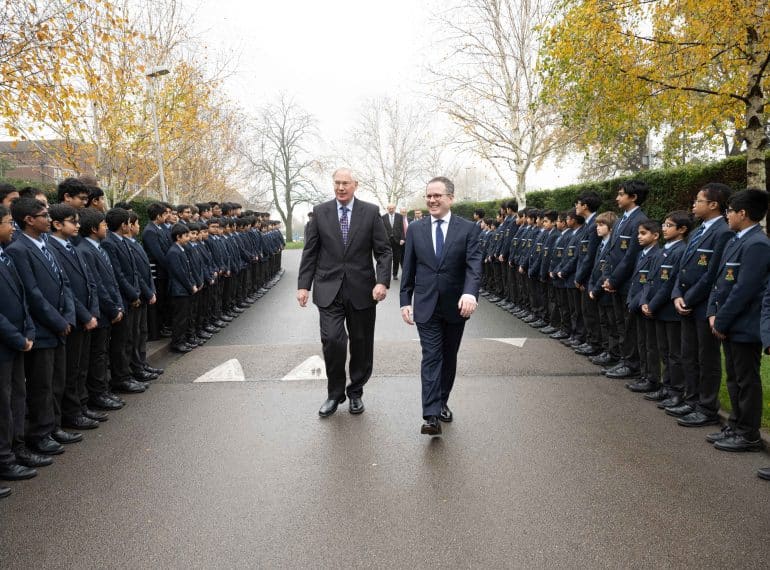
HRH The Duke of Gloucester today visited QE, as the reigning Sunday Times State Secondary School of the Year prepares to celebrate its 450th anniversary early next year.
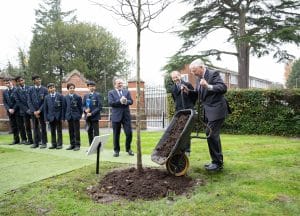 Members of the School’s Combined Cadet Force flanked the main entrance and the senior rugby team provided a sporting backdrop as the Duke arrived for his visit, during which he marked the anniversary by planting an oak tree and by presenting a specially embroidered banner to Headmaster Neil Enright.
Members of the School’s Combined Cadet Force flanked the main entrance and the senior rugby team provided a sporting backdrop as the Duke arrived for his visit, during which he marked the anniversary by planting an oak tree and by presenting a specially embroidered banner to Headmaster Neil Enright.
The visit had an eye to the future as well as the past: the Duke was given a demonstration of VEX Robotics – QE is a multi-time UK champion and was the first UK school to win a World Championship title – and even tried out driving the robots himself.
He came to QE almost exactly 90 years after another royal visit, by HRH The Prince George, Duke of Kent, who opened the new buildings – still in use as QE’s Main Building – following the School’s relocation from its historic Tudor Hall site in Wood Street, Barnet.
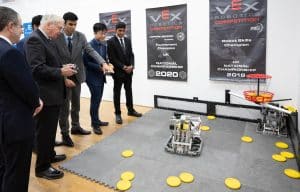 Following the visit, Mr Enright said: “It was a tremendous honour and my great pleasure to welcome HRH The Duke of Gloucester today. With the anniversary fast approaching, there was much to show him, including the School’s original 1573 Charter signed by Elizabeth I, our Ties through Time installation of 232 School photographs from the 1880s until comparatively modern times, and, to bring things right up to date, the robots and our new Music building, opened in May.
Following the visit, Mr Enright said: “It was a tremendous honour and my great pleasure to welcome HRH The Duke of Gloucester today. With the anniversary fast approaching, there was much to show him, including the School’s original 1573 Charter signed by Elizabeth I, our Ties through Time installation of 232 School photographs from the 1880s until comparatively modern times, and, to bring things right up to date, the robots and our new Music building, opened in May.
“The Duke showed a keen interest in everything, and I know our roboteers will be especially delighted that he was brave enough to try his hand at the controls of two of their creations.”
On his arrival, the Duke was presented to the Headmaster by Martin Russell, Representative Deputy Lieutenant of the London Borough of Barnet and a former QE parent.
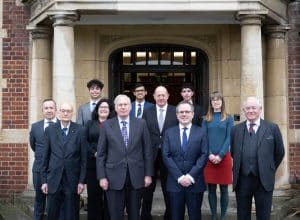 He was then introduced to:
He was then introduced to:
- Barrie Martin, MBE (Chairman of Governors and Chairman of the Friends of Queen Elizabeth’s)
- Nick Gaskell (Vice-Chairman of Governors)
- The three Deputy Heads: Anne Macdonald (Academic); David Ryan (Pastoral) and Tara O’Reilly (Operations)
- School Captain (head boy) Theo Mama-Kahn, and Senior Vice-Captains Ansh Jassra and Antony Yassa, all of Year 13.
The Duke was shown the charter and Royal Seal, together with original artefacts from the 1932 royal visit drawn from the School’s archives. The materials were introduced by Jenni Blackford, Curator of QE Collections and Head of Library Services, and two Year 13 boys involved in the work with the archives, Ishaan Mehta and 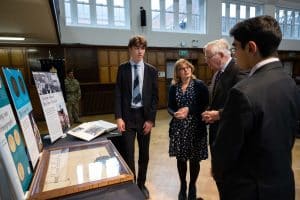 Gabriel Gulliford.
Gabriel Gulliford.
The Headmaster then gave a formal welcome to the Duke in front of 100 selected pupils in the Main School Hall. He said: “Your Royal Highness, it is my honour and privilege to offer you the warmest welcome on behalf of the Elizabethan community…2022 has been a year full of accomplishment at the School. We have had our status as an outstanding school confirmed by Ofsted, been named State Secondary School of the Year by The Sunday Times, and opened The Friends’ Recital Hall and Music Rooms – the latest enhancement to our campus, built from the generosity of our School community. You could say it has been our annus mirabilis.”
QE’s Senior Barbershop group sang the hymn Abide with Me while the new School banner was brought into the hall by a representative of the CCF. Commissioned in advance of the 450th anniversary service being held in Westminster Abbey on 24th March 2023, the banner was passed to the Duke, who presented it to the Headmaster.
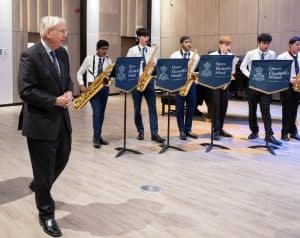 After visiting the Ties through Time photographic installation and enjoying the robotics in the School’s Conference Centre, the royal party headed to the new Music building to watch rehearsals for this Thursday’s Winter Concert under the watchful eye of Director of Music Ruth Partington.
After visiting the Ties through Time photographic installation and enjoying the robotics in the School’s Conference Centre, the royal party headed to the new Music building to watch rehearsals for this Thursday’s Winter Concert under the watchful eye of Director of Music Ruth Partington.
Then it was back to the front of the School before the Duke walked down the drive, lined by Year 7 pupils, stopping close to the gates to plant the anniversary oak tree. It is intended that the tree, which has been marked with a commemorative plaque, will come into full leaf for the first time at the School in the spring of 2023.
The tree will also form part of The Queen’s Green Canopy project inaugurated to mark Queen Elizabeth II’s Platinum Jubilee. Senior Vice-Captain Antony Yassa read a short extract from the wording of a new anthem composed for the anniversary year by internationally renowned composer, Howard Goodall, which is to receive its debut performance in Westminster Abbey in March: “Let us fill this place with hope. Face fate and fortune in our stride. That like an oak, we draw our strength from ancient roots spread deep and wide. From ancient roots spread deep and wide.”
Pupil representatives from the School’s Eco Network and its six Houses placed soil at the base of the tree, with the Duke invited to complete the process.
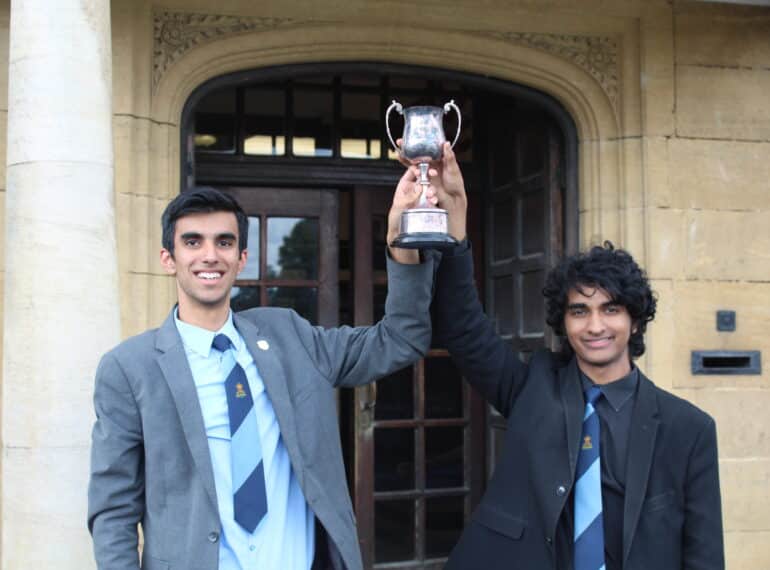
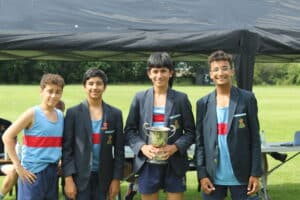 The eagerly awaited result was announced to great excitement in the end-of-year assembly. This academic year’s competition was an emphatic reversal of last year: Stapylton not only enjoyed a certain margin of victory over runners-up Leicester, they also left the 2021–2022 winners, Harrisons’, languishing in the lower reaches of the points table.
The eagerly awaited result was announced to great excitement in the end-of-year assembly. This academic year’s competition was an emphatic reversal of last year: Stapylton not only enjoyed a certain margin of victory over runners-up Leicester, they also left the 2021–2022 winners, Harrisons’, languishing in the lower reaches of the points table. The House system is run by the boys themselves, with each of the six Houses having a House Captain, Deputy House Captain and Charities Officer. Each form within every year group also has a House representative.
The House system is run by the boys themselves, with each of the six Houses having a House Captain, Deputy House Captain and Charities Officer. Each form within every year group also has a House representative.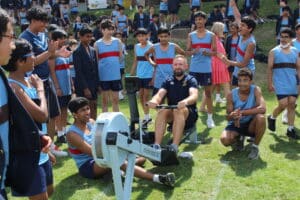 Points are also awarded based on the totals of merits, good notes and commendations earned across the year groups.
Points are also awarded based on the totals of merits, good notes and commendations earned across the year groups.
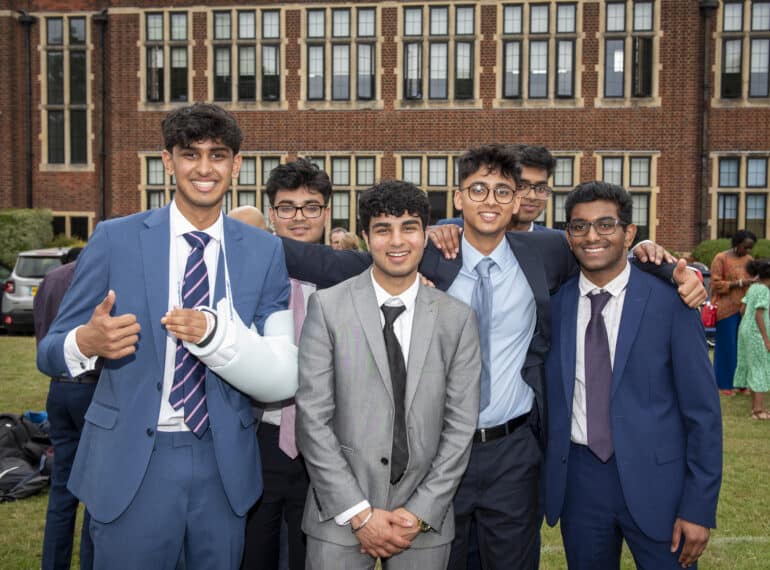
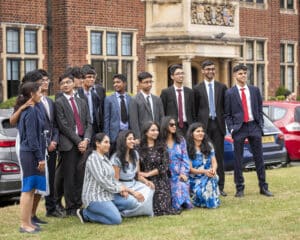 There were prizes for some, while the contribution of all the leavers – or graduands – was celebrated during an occasion in Shearly Hall that featured speeches and presentations, followed by afternoon tea on Staplyton Field.
There were prizes for some, while the contribution of all the leavers – or graduands – was celebrated during an occasion in Shearly Hall that featured speeches and presentations, followed by afternoon tea on Staplyton Field.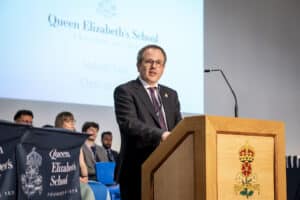 Headmaster Neil Enright thanked parents for their “huge support, both moral and financial, over the years” and urged both them and their sons to stay in touch with the School.
Headmaster Neil Enright thanked parents for their “huge support, both moral and financial, over the years” and urged both them and their sons to stay in touch with the School. Sahil attended Valediction together with his mother, cousin, friends and his brother, Nikhil Handa (OE 2013–2020). He recalled his first encounter with Deputy Head (Pastoral) David Ryan, who hauled him over the coals after spotting him dancing outside the classroom window to entertain his classmates during afternoon form time. This less-than-auspicious beginning soon turned into a supportive relationship, however, when he became part of Mr Ryan’s English class. “I thought he’d make my life miserable. But to my surprise, it seemed as though he’d forgotten the whole episode entirely. I went on to learn everything from him… Mr Ryan was also the first person who complimented me for being a generalist.”
Sahil attended Valediction together with his mother, cousin, friends and his brother, Nikhil Handa (OE 2013–2020). He recalled his first encounter with Deputy Head (Pastoral) David Ryan, who hauled him over the coals after spotting him dancing outside the classroom window to entertain his classmates during afternoon form time. This less-than-auspicious beginning soon turned into a supportive relationship, however, when he became part of Mr Ryan’s English class. “I thought he’d make my life miserable. But to my surprise, it seemed as though he’d forgotten the whole episode entirely. I went on to learn everything from him… Mr Ryan was also the first person who complimented me for being a generalist.”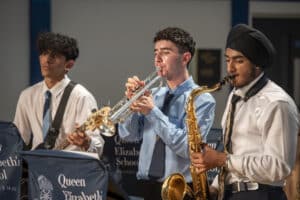 A large majority of Year 13 students attended. All received a set of QE cufflinks, while the prizewinners also received a copy of former Headmaster Dr John Marincowitz’s new history of the School, Queen Elizabeth’s School: 1573–2023. Among the speakers was Theo Mama-Kahn, School Captain 2022, who was one of the leavers. He gave a vote of thanks.
A large majority of Year 13 students attended. All received a set of QE cufflinks, while the prizewinners also received a copy of former Headmaster Dr John Marincowitz’s new history of the School, Queen Elizabeth’s School: 1573–2023. Among the speakers was Theo Mama-Kahn, School Captain 2022, who was one of the leavers. He gave a vote of thanks.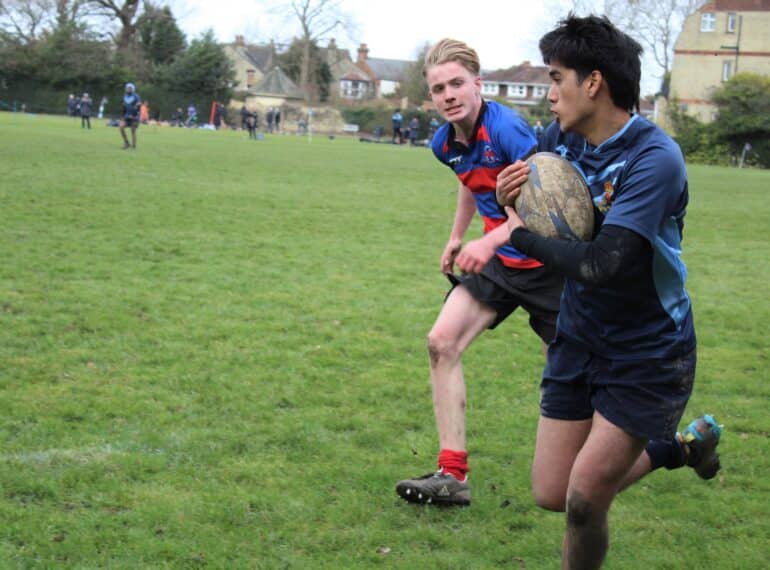
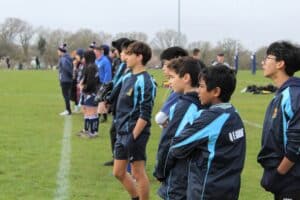 With events targeted at players from all years, the festival was one of a number of innovative subject festivals being held as part of QE’s new Flourish extra-curricular programme.
With events targeted at players from all years, the festival was one of a number of innovative subject festivals being held as part of QE’s new Flourish extra-curricular programme.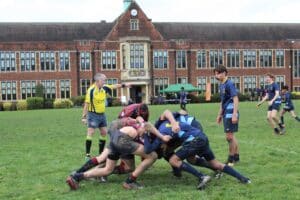 The festival began with last month’s 47th Annual QE Rugby Sevens Tournament, the second-largest schools sevens tournament in the country.
The festival began with last month’s 47th Annual QE Rugby Sevens Tournament, the second-largest schools sevens tournament in the country.
 Members of the School’s Combined Cadet Force flanked the main entrance and the senior rugby team provided a sporting backdrop as the Duke arrived for his visit, during which he marked the anniversary by planting an oak tree and by presenting a specially embroidered banner to Headmaster Neil Enright.
Members of the School’s Combined Cadet Force flanked the main entrance and the senior rugby team provided a sporting backdrop as the Duke arrived for his visit, during which he marked the anniversary by planting an oak tree and by presenting a specially embroidered banner to Headmaster Neil Enright. Following the visit, Mr Enright said: “It was a tremendous honour and my great pleasure to welcome HRH The Duke of Gloucester today. With the anniversary fast approaching, there was much to show him, including the School’s original 1573 Charter signed by Elizabeth I, our Ties through Time installation of 232 School photographs from the 1880s until comparatively modern times, and, to bring things right up to date, the robots and our new Music building, opened in May.
Following the visit, Mr Enright said: “It was a tremendous honour and my great pleasure to welcome HRH The Duke of Gloucester today. With the anniversary fast approaching, there was much to show him, including the School’s original 1573 Charter signed by Elizabeth I, our Ties through Time installation of 232 School photographs from the 1880s until comparatively modern times, and, to bring things right up to date, the robots and our new Music building, opened in May. He was then introduced to:
He was then introduced to: Gabriel Gulliford.
Gabriel Gulliford. After visiting the Ties through Time photographic installation and enjoying the robotics in the School’s Conference Centre, the royal party headed to the new Music building to watch rehearsals for this Thursday’s Winter Concert under the watchful eye of Director of Music Ruth Partington.
After visiting the Ties through Time photographic installation and enjoying the robotics in the School’s Conference Centre, the royal party headed to the new Music building to watch rehearsals for this Thursday’s Winter Concert under the watchful eye of Director of Music Ruth Partington.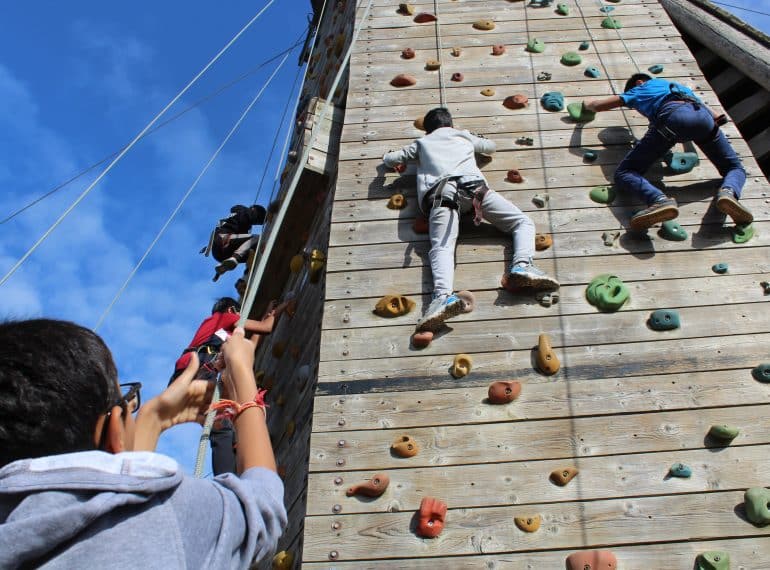
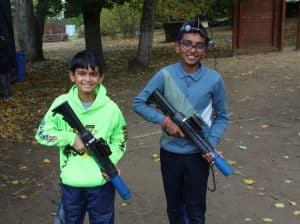 The visit to Stubbers Adventure Centre involved climbing, canoeing, archery and laser tag, with competition aplenty as the boys took on their friends and classmates.
The visit to Stubbers Adventure Centre involved climbing, canoeing, archery and laser tag, with competition aplenty as the boys took on their friends and classmates. The trip was part of the new QE Flourish enrichment programme, which Mr Bonham-Carter oversees.
The trip was part of the new QE Flourish enrichment programme, which Mr Bonham-Carter oversees.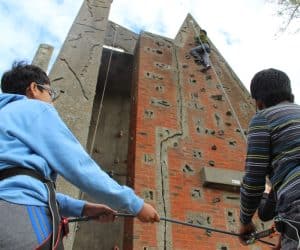 Alongside the healthy competition, some of the activities involved an element of trust. In the wall-climbing, for example, participants had to rely on their team-mates who were on the ground holding their ropes.
Alongside the healthy competition, some of the activities involved an element of trust. In the wall-climbing, for example, participants had to rely on their team-mates who were on the ground holding their ropes.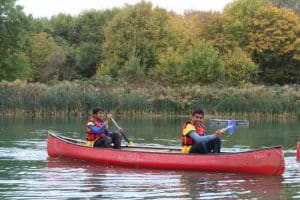 “On the coach journey home, I had my left-over snacks from lunchtime, thinking what fun I had and what memories I made.”
“On the coach journey home, I had my left-over snacks from lunchtime, thinking what fun I had and what memories I made.”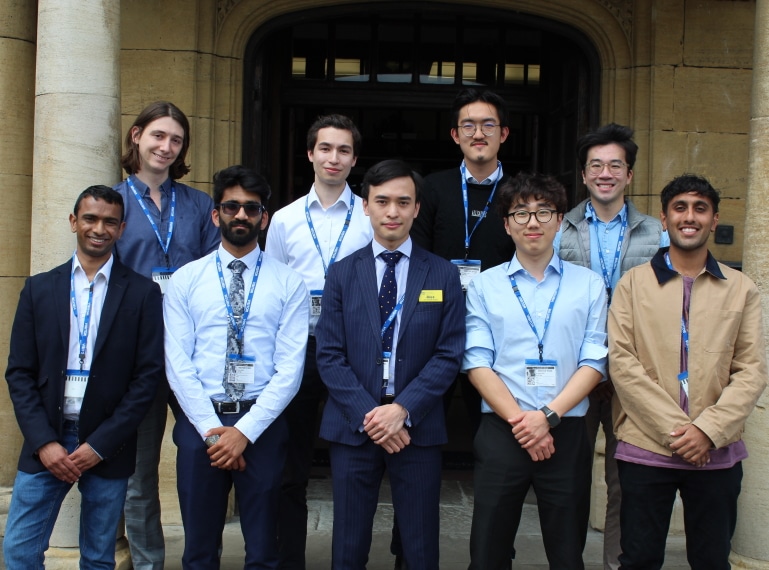
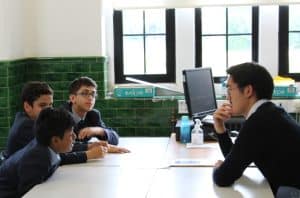 All but one of the group from the Class of 2016 (those who started at QE in 2009) were from Broughton House, and so they duly enjoyed the opportunity to talk to the young Broughtonians of today.
All but one of the group from the Class of 2016 (those who started at QE in 2009) were from Broughton House, and so they duly enjoyed the opportunity to talk to the young Broughtonians of today.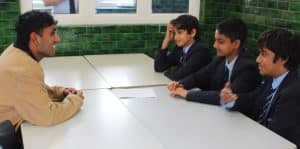 They then did a careers ‘speed-dating’ workshop in which they introduced their roles and industries, and the key skills and routes into it, to small groups of Year 8 boys. The group included doctors, engineers, a lawyer and a representative of the film industry. There was an opportunity for the boys to ask questions of the visitors.
They then did a careers ‘speed-dating’ workshop in which they introduced their roles and industries, and the key skills and routes into it, to small groups of Year 8 boys. The group included doctors, engineers, a lawyer and a representative of the film industry. There was an opportunity for the boys to ask questions of the visitors.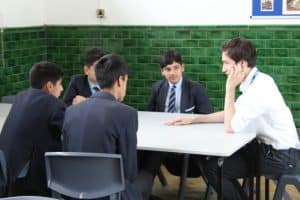 Two engineers: mechanical engineer Lampojan Raveenthiranathan, who studied at UCL and now works for a company which designs and manufactures components for military aircraft ejector seats, and civil engineer Roderick Lee;
Two engineers: mechanical engineer Lampojan Raveenthiranathan, who studied at UCL and now works for a company which designs and manufactures components for military aircraft ejector seats, and civil engineer Roderick Lee;